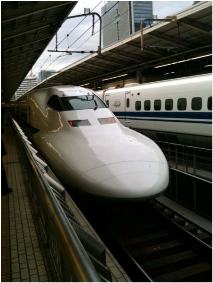 On the way back to the Britain I arranged to stop off in Japan to learn from the UKTI team there and to share the UKTI Australasia journey with them. It’s my first time in Japan so this adds an additional air of excitement to the trip.
On the way back to the Britain I arranged to stop off in Japan to learn from the UKTI team there and to share the UKTI Australasia journey with them. It’s my first time in Japan so this adds an additional air of excitement to the trip.
Arriving at Tokyo Narita airport sets the scene for my perception of the country. The airport is minimalist, sparsely decorated with a mix of whale calls and Balinese chimes playing over the speakers. Every hundred or so metres there is an art installation showing items such as roof tiles, a wall and floor tiles. It feels a bit like this is a museum showing technology that we once used – have I jumped ahead 50 years?
Day one and I am off to Osaka on the bullet train. This takes me back to my youth of playing ‘World Trains Top Trumps’. Today I win hands down. The train is fast, on time, comfortable, quiet and full. The Japanese have embraced mass transit and perfected it. As I charge off through the countryside, I wonder if the UK will ever be able to whisk people from Glasgow to London in less time than it takes to check in and fly.
I met with the trade and investment teams in Osaka, a large sprawling city. The investment teams work with some of the world’s largest companies as well as with smaller, smart companies supporting them to set up in UK. I was impressed by the dominance of R&D in their work. The team work hard to find a fit for this high value R&D with partners in UK. The value this should bring to the UK economy must be hard to measure and will probably take years to reach its full potential. I am convinced we must continue to support Japanese (and all other) companies, with this high value R&D to invest in the UK. Of course we also need to make sure we have an effective, business-focused approach to visas, as well as offering them an outstanding business environment when they arrive!
The trade team work with British companies supporting them to export to Japan. This country is obviously wealthy and developed, but it also has a very different language and business culture to UK. The trade team can ensure UK companies understand this market, their competitors, pricing and regulations. Given the inability of the majority of UK businesses to interact directly with Japanese companies, the value the team adds is remarkable. What other country provides this expertise, language ability, on-going high quality support to their exporters? These services are world class.
Paul Noon
Deputy Consul General & Director of Trade for Australia and New Zealand
